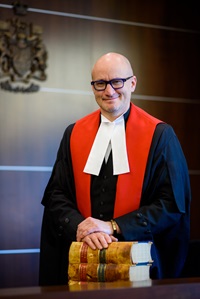 One of Court of Queen’s Bench of Alberta Justice Nicholas (Nick) Devlin's most significant contributions to the law and pursuit of justice in Canada is his extensive experience teaching trial advocacy skills to lawyers and law students.
One of Court of Queen’s Bench of Alberta Justice Nicholas (Nick) Devlin's most significant contributions to the law and pursuit of justice in Canada is his extensive experience teaching trial advocacy skills to lawyers and law students.
During his time with the Public Prosecution Service of Canada, the Calgary-based Justice taught hundreds of lawyers and students the craft of examining witnesses, in both direct examination and cross, including a unique and popular approach he personally developed.
“Some of my happiest moments professionally have come from emails I received from lawyers who have taken the workshop telling me that it changed or improved the way they do trials and has given them more confidence in their work,” says Justice Devlin.
“For years I opened every session I taught by telling the students that good advocates are not born, they are made, and that it is a learnable skill that they can master, irrespective of who they are or how they sound,” he says.
“Helping them prove that to themselves in the days that follow is, undeniably, one of the most satisfying things I have ever been able to do. Every lawyer who does not fit the Rumpole-of-the-Bailey mold, but walks out into the profession with confidence and skill, is a win for the future of the Bar.”
Justice Devlin - whose appointment to QB was announced on May 22, 2019 - was born and raised in Calgary. He attended the University of Calgary between 1989 and 1993, graduating with a BA with Honours in Canadian Studies. He then attended the U of C’s Faculty of Law and graduated as its Gold Medalist in 1996. He was also the first student to be admitted to the Order of the University of Calgary. He then completed his LL.M. at the University of Toronto in 1998 before serving as law clerk to the Honourable Justice Jack Major, then of the Supreme Court of Canada.
Justice Devlin began his practice in the litigation department of Torys LLP in Toronto in 2000, before spending a year at the Middle Temple in London, England as a Fox Scholar. In 2001, he joined the Public Prosecution Service, working in Toronto for four years before transferring to Calgary for a year and then returning to Toronto, where he served in various capacities including Appeals Team Leader and then Appeals Coordinator, before coming back home to Calgary as Senior General Counsel in 2016.
As a member of the Alberta, Nunavut and Ontario Bars, his practice focused on complex criminal and constitutional trials and appeals and spanned the northern reaches of Baffin Island to the Supreme Court of Canada, where he regularly appeared on behalf of the Crown.
As a federal prosecutor, Justice Devlin was precluded from legal practice other than within his employment, however he made substantial pro bono contributions through teaching and professional development. As well as teaching trial advocacy techniques, the passionate teacher contributed to continuing legal education programs on a wide range of topics. He also served as an adjunct professor at Osgoode Hall Law School from 2013 to 2017.
The Alberta jurist believes his heritage, his upbringing, his early work experience as a photojournalist and his many years as a criminal lawyer have provided him insight into the diversity of Canadians.
“I grew up as the only child of a recent immigrant, an outsider and poor, and both in my life and in my work, I have lived and witnessed a lot of the diversity that makes up this country” says Justice Devlin. “Physically, I have been lucky enough to set foot in every province and territory, and to have explored many of them at some length, usually with my camera in hand seeking images of the land and the people.”
He recalls how his time as a photojournalist in the mid-1990s brought him into close contact with a vast variety of Canadians, in situations from the happy to the horrific.
“I have sat in a shack on the Fraser River listening to a fisherman’s voice break with fear at the prospect of losing his livelihood, watched paramedics work to revive a child rescued from a burning home and watched political devotees dance in euphoria at their candidates’ victories,” he says, adding he also received insight from covering the first Gay Pride march in Calgary.
“At the time I had no idea how much the revolution in the social, legal and cultural treatment of the LGBTQ2S community would mean for many of the people closest to me,” he says.
Justice Devlin’s legal career also afforded him many opportunities to witness the myriad of human experiences that make up our country.
“I have seen up-close the desperation in the eyes of a crack-addicted accused standing before a bail court, the generosity and forgiveness of families who have lost loved ones, and the hopefulness in the eyes of a Drug Treatment Court graduate on the day their charges are withdrawn.”
When not working, Justice Devlin can be found hiking, photographing or restoring old cedar canvas canoes.